 Although it trails football and horse racing by some margin, golf is narrowly the third most popular betting sport in the UK.
Although it trails football and horse racing by some margin, golf is narrowly the third most popular betting sport in the UK.
Its strong following is not only found in the birthplace of the game itself though, as betting activity comes from all over the globe.
This is hardly surprising when you consider the huge audiences that major golf tournaments regularly attract.
Thanks to this, provided you are based in a country where online gambling is legal, finding a website to place your golf bets is rarely a challenge.
Some websites are better than others when it comes to golf of course, but generally speaking, it is something bookmakers cover well.
How to Bet on Golf

From a betting perspective, golf is unlike most other sports. Rather than having lots of fixtures where it’s one person or team versus another, professional golf operates by having semi-regular, high-participation tournaments.
Although golfers can be paired up (or made into threesomes), for a tournament they aren’t directly competing against one another in the normal sense. Instead, everyone is competing against everyone else as they all seek the lowest score possible.
Another way in which golf differs from most other sports is that choosing the winner of an event tends to be a much tougher ask. There are a lot of players involved in each tournament (usually over 100) and there is often not a great deal between many of them.
This means that even the tournament favourite can have a double-digit price, or very close to it. While picking a tournament winner may be a little daunting though, this is far from the only way you can bet on golf.
Main Bets on Golf
For what is a very simple game, in theory, golf comes with a surprisingly large number of different markets. You are likely to come across a huge selection for any major tournament, often broken down into two or three sections.
We will cover the most popular options within each section here to give you an idea of what to expect.
Tournament Markets
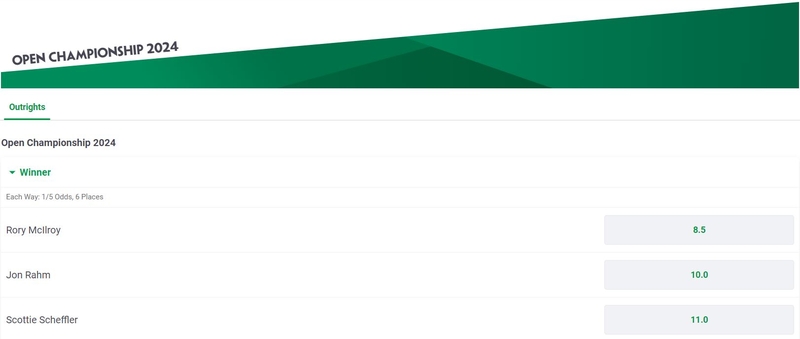
To begin with, we will look at tournament markets, these being markets that relate to the entire event.
- To Win Outright – This is simply which player (or possibly team, for events such as the Ryder Cup) will win the tournament. Within this market, it is popular to place an each-way bet as it can still give you some returns should your pick finish just a few places from first.
- Tournament Winning Margin – A bet on how many shots the leading player will win by.
- Straight/Dual Forecast – With this challenging bet you must pick the players you think will finish first and second overall. You need the exact order for a straight forecast, and either order for a dual forecast.
- Betting Without – A bet on the tournament winner but where a selected player (usually the favourite) is removed from the final standings for the purposes of the bet.
- Winning Margin – A bet on how many shots the top golfer will win the competition by.
- Group Betting – Here golfers are pooled together in different groups for the purposes of betting. You must select the golfer that ends up topping this created group in terms of their overall performance.
- Match Handicap – A bet on a golfer to record the lowest score after a handicap value has been applied to them.
- 72 Hole Match Ups – Most professional tournaments follow a 72-hole format so for this market you will need to select which player will record the lowest overall score from the two that have been paired together hypothetically for betting purposes.
- Top Nationality – Which golfer will be the top performer from their country/continent? Different regions will be offered so you could have Top American or Top European, for example.
Day/Round Markets

As golf tournaments are broken into several days/sessions/rounds, betting can often focus on one of these individually, rather than the tournament as a whole. With some markets, you will only be able to bet on the next upcoming day/round, so pre-event this means having betting options relating to the first day/round.
Where you see 2/3 ball markets, these relate to the pairings (for 2-ball) or threesomes (for 3-ball) that players are allocated. It could be for instance one threesome features McIlroy, Rahm and Hovland. These three may then play the opening two rounds together before the field is cut and then it usually reverts to pairs. Bookmakers can also create ‘mythical’ pairings and threesomes that exist purely for betting purposes, but as standard, these markets reflect the real-life combinations.
- 2/3 Ball – Out of the two/three players scheduled to play together, which of these will register the lowest round/day score?
- 2/3 Ball To Take The Lead First – Which player out of the two/three chosen together will be the first to gain an advantage in the standings?
- 2/3 Ball Lead After x Holes – A bet on which player will be leading after a specified number of holes has been played.
- 2/3 Ball Handicap – A bet on the winner of the pairing/threesome but where one selected player is given a plus or minus points score to their actual total.
- 2/3 Ball First Player Under/Over Par – Here you are betting on the first player within the group to be under par, or over par, depending on the market selected.
- Round/Day Leader – A bet on which player, out of the entire field, will be in the lead at the time everyone has completed the round.
- Round/Day Winner – Predict which golfer, from all those involved, will register the lowest score for the specified day/round.
- To Lead After… – A bet on which player will be in the lead after a certain number of rounds have been played.
- Round/Day Handicap Betting – Pick a golfer to win the day or session with a handicap value applied to their score.
The final thing to mention is that markets can differ depending on the format of the tournament. If you were to take something more out of the ordinary like the Ryder Cup, its unique format does present some extra options.
Other Types of Bet

Although the bulk of golf betting involves placing money, individually, on the markets listed above, there are other ways to bet.
Accumulators
Accumulators are not a big part of golf betting but they are worth a quick mention. What this bet type enables you to do is combine selections from different golf events to form one bet. For example, you could back Scheffler for the US Masters, Koepka for the US Open and Europe for the Ryder Cup. You do not have to stick to the ‘tournament winner’ market though, nor do you just have to stick with golf. You can combine other markets and other sports when creating an accumulator bet.
In-Play Betting
Almost all sports support in-play betting and golf is no exception. If you want to bet on the outcome of the next hole or on the tournament winner while the action is ongoing, this is something you can easily find. There are usually plenty of markets available and some websites provide some helpful live stats/graphics too. This can help inform your betting decisions when you are unable to watch the action.
Specials
As golf is a popular betting sport, many bookmakers will offer a range of special bets for it. These can relate to specific tournaments and commonly you would expect to find special bets to be those with enhanced odds. You may also find a bookmaker offering better than standard each-way terms for the ‘tournament winner’ market. At the upper end of the scale, you can expect a top bookmaker to cover 10/12 places at 1/5 or 1/6 odds.
There are also some special longer-term bets, which you can find at some bigger names. These include bets such as to win a major in the calendar year, or to win 2+ majors. The range of these is not huge though so some bets may need to be made via special request.
Important Rules for Golf Betting
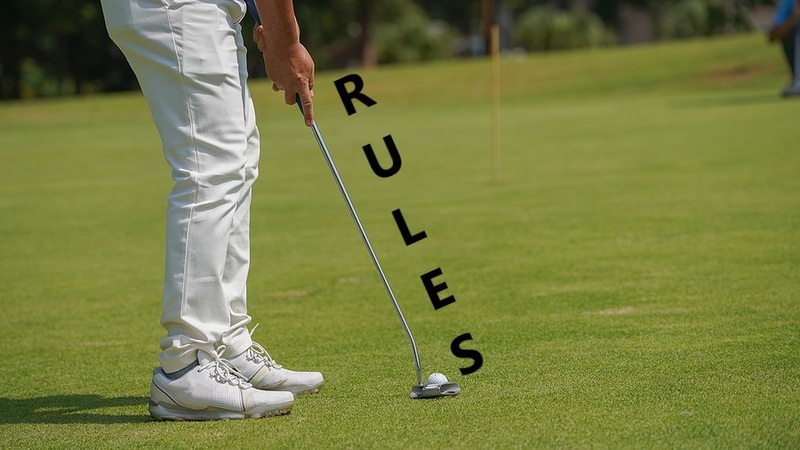
For a simple game, golf betting comes with a long set of rules.
Although they do normally make sense and are not unfair to customers, it is worth giving them a quick flick-through.
The below list acts as a general guide but each bookmaker will have their own policy which may differ slightly from others.
- Ties – Although most tournaments will have an outright winner, ties will exist lower down the pecking order (impacting each way bets). Where dead heats do occur, you will get some money back but not the full return. The calculation will depend on the market and how many players are tied.
- 2/3 Ball Ties – Usually bookmakers offer ties as an option for 2-ball round betting so in the event of a tie, any bets not placed on the tie will lose. For 3-ball however, a draw is not typically offered so dead heat rules would apply here.
- Involvement – All bets on a player who takes no part in a tournament will be voided. Once they have teed off, however, bets will stand.
- Play-offs – The outcome of a play-off will count to settle any tournament winner bets. If there is no play-off as per tournament rules and two (or more) players end up tied, dead heat rules will apply.
- Settlement – Official tour results at the time of the trophy presentation will be used to settle all outstanding bets. Any disqualifications after this point have no impact.
- Reduced Duration Competitions – If adverse weather (or something else) causes a tournament to be shortened then the trophy presentation will be used to settle bets, if at least 36 holes have been played. If fewer holes have been played, bets will be voided unless the market has been settled already.
- Match Ups – If one player fails to make the cut, the other is deemed to be the winner. If both players miss the cut, the lowest score at the time of the cut will be used to determine the bet winner.
Golf Betting Guides
Betting on golf gives the punter more choices and more freedom than most other sports, with a multitude of bet types covering a wide range of possibilities. It’s a sport where you can bet without, bet on the top 5 or 10, and still get good outright odds on top quality players thanks to the way the game is played.
Knowing this is possible is only half of the battle though, knowing when and how to do it effectively is what will win you more bets. The articles below cover every element of betting on golf in quick and easy to read chunks, so you can improve your golf betting handicap while on a break, on the bus, or on the loo.

Why Does 'Sub Par' Mean Bad Instead of Good?
The English language is a tricky beast at times, and the sport of golf is full of confusing terms and phrases, so mix the two together and the uninitiated can be in for a confusing time. The usually negative terms 'sub par' or 'under par' take on a different meaning in golf, and here is why.
Stroke Play v Match Play: What's the Difference?
Most golf fans will be familiar with stroke play, even if they do not know it, because that is the form most tournaments take, but match play allows for a more tactical approach to the game and suits a more aggressive player, whereas stroke play is all about consistency.
At What Age Do Professional Golfers Retire?
Golfers tend to have a longer professional lifespan than those in other sports such as football and tennis. The sport does not require the same levels of stamina and so, as long as a player remains relatively fit and keeps their skills sharp, they can still compete. But for how long?
What is the Risk Reward Challenge in Golf
A season long competition which seeks to find the best decision makers in the game, the Risk Reward Challenge offers a huge prize but hasn't exactly ignited the imaginations of fans or players. Nevertheless, it is an interesting additional point of interest for anyone following the season, and we explain how it works within.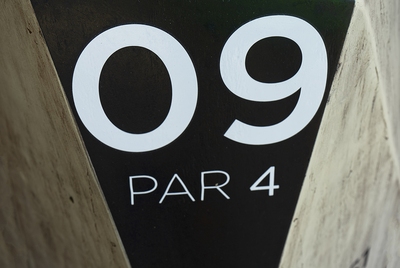
What Does Par Mean in Golf?
Even those with no idea about golf will have heard the phrase "That's par for the course". The word itself has an interesting history, but if you want to understand golf then getting to grips with what par means, and how it effects scoring is absolutely essential and a great place to start.
What do Bogie, Birdie, Eagle and Albatross Mean in Golf?
Many sports have their own quirky words or phrases, but golf stands apart in this respect with many of the famous sound offs seemingly having no clear relation to the sport at all. Why are so many birds involved, and what on earth is a bogey? They all have stories behind them, and some are fascinating.
What is the World Cup of Golf?
If someone told you they had never heard of the football World Cup you wouldn't believe them, but the World Cup of golf? You might understand that a little more. But why is this national competition lesser known and what is it all about?
Can Men and Women Compete Together in Golf?
Gender equality is quite rightly widely promoted, but in sport, the gender divide is often down to fairness. A female boxer vs a male boxer wouldn't be a particularly fair fight, for example, but there are sports where physicality is less important like snooker. Where does golf fit into all of this?
How Do Dead Heats Work in Golf?
Dead heats are much more prevalent in golf than in many other sports, to the extent were you sometimes see 3 or 4 players tied for a certain spot. As a bettor, you should know what this means for your payout if it affects one of your bets.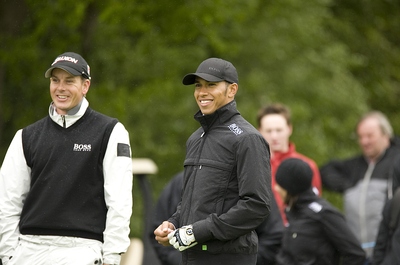
What Are Pro Am Golf Tournaments?
Every fancied playing against your favourite golf pro in a tournament? A pro am would be the way to do it, although sadly it's not quite as simple as signing up and trying your luck. You can learn all about them in this article though.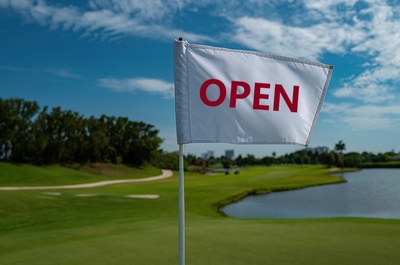
What is an Open Golf Tournament?
You would be forgiven for thinking that anybody could enter an 'open' tournament, but in golf, an open isn't quite as open as it sounds. However, they are certainly easier to gain access to than invitationals, and we cover some of the biggest opens in this article.
What is a Golf Invitational?
The clue is in the name, but as ever, this isn't quite as straightforward as that. The basic difference between an open and an invitational is fairly obvious, although it is explained properly within and the biggest invitationals are covered as well.
How Do Team Tournaments in Golf Work?
Many bettors would struggle to name a team tournament in gold other than the Ryder cup, but there are plenty of them out there presenting opportunities for punters who know the sport. A team tournament is not the same thing as pairs though, which this article makes clear.
Top 'X' Betting in Golf
The X can mean anything, but is most commonly a country, so the bet would be on the top player from the USA, or from Ireland etc. This can throw up some interesting possibilities when it comes to dead heats, and the odds can vary quite a bit from bet to bet too.
What Does it Mean To Make the Cut in Golf
A nice simple bet which you can apply to any player on the field in most competitions. However, there are still some rules to be aware of and some tips you can put into practice to give yourself the best chance of success.
72 Hole Betting in Golf
Sometimes called match betting, sometimes called tournament match betting, and sometimes called 72 hole betting, it all amounts to the same thing; you are betting on the outcome between just two of the golfers in the field regardless of how many others are competing.
Golf: 2 & 3 Ball betting
Golf is a long game, and betting on tournaments can be fun but it takes ages for your bet to resolve. For a quicker fix and a better chance of winning betting on the 2 ball or 3 ball market is the perfect anecdote, focusing on the short term performances of a few specific players.
Top 5/10/20 Betting in Golf Tournaments
Betting on the winner of the tournament may come with better odds, but there is another bet which leaves the punter more wiggle room and can still offer decent potential net wins; the Top 5/10/20 bet. What is it? How does it work? And how is it best used? Let us tell you.
